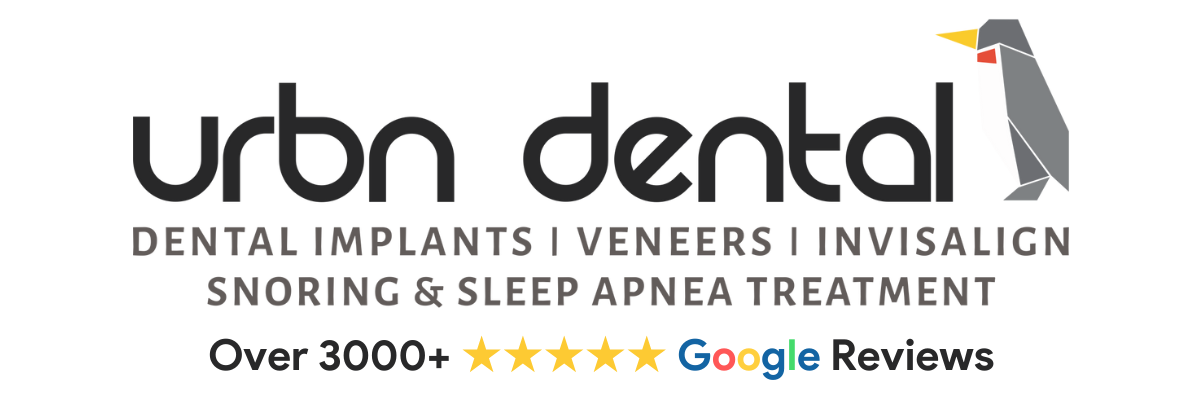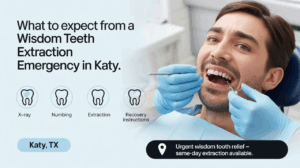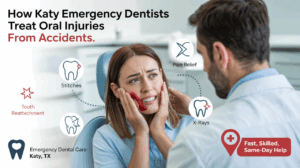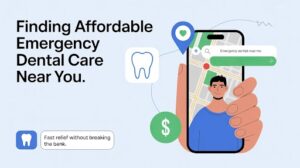A tooth abscess is a type of tooth infection. It occurs due to a build-up of pus that is formed inside the gums or teeth. A tooth abscess is a pus-filled cavity that results from inflammation and is usually caused by bacterial infection, often an infection that has accumulated in the soft pulp of the tooth.
Bacteria can be found in the saliva, plaque, and food chunks. These bacteria can stick to the teeth and gums to damage them. If these plaques and food chunks are not removed by good and proper oral practice like regular brushing and flossing, the bacteria will build-up and may spread inside the soft pulp of the gums and teeth. This subsequently results in tooth infection known as a tooth abscess.
Basic Facts about Dental Abscess
Here are some basic facts you may need to know about a dental abscess.
- There are basically 3 types of dental abscess, which are gingival abscess, periodontal abscess, and periapical abscess.
- The tooth infection symptoms include pain, fever, and a bad taste in the mouth.
- A dental abscess is caused by a bacterial infection.
- Tooth infection treatment may involve root canal surgery.
- In order to minimize the pain, it is advisable to avoid cold foods and drinks and use a soft-bristle toothbrush.
Tooth Infection Symptoms
The main symptoms of tooth infection is severe pain. Other signs and symptoms include:
- Difficulties when swallowing or breathing.
- Tender, swollen lymph nodes under your jaw or in your neck
- A general feeling of illness
- Difficulties in opening the mouth
- A foul or bad taste, salty fluid in the mouth, especially when the abscess ruptures
- Insomnia
- Fever
- Sensitivity to hot or cold food and drink
- Sensitivity to the pressure of biting and chewing
- General pain in the affected area when chewing, biting or touching.
- Swelling of the face and cheek
As stated above, pain is the main symptoms of a tooth infection. This may be a throbbing pain, which may be intense. The throbbing pain normally starts suddenly and grows into a more intense pain over a few hours or days. The pain may sometimes spread to the jawbone, ears, and neck.
The severity and location of the symptoms are usually dictated by the type of dental abscess
Types of Tooth Infection
As stated earlier, there are basically 3 types of dental abscess:
- Gingival abscess: This tooth infection only affects the gingival tissue (gums) and does not affect the teeth or the periodontal (surrounding) tissues.
- Periodontal abscess: This tooth infection affects the supporting bone structures of the teeth.
- Periapical abscess: this tooth infection starts in the soft pulp of the tooth.
When to See a Doctor
Immediately you notice any of the signs and symptoms above, visit your dentist office near me promptly. If you experience pains, fever and any swelling in any part of your face, don’t hesitate to consult your dentist. Difficulty in swallowing or breathing may indicate that the tooth infection has radiated deeper into your jawbone and surrounding tissue. So, try as much as possible to consult your dentist immediately. Schedule an appointment at Emergency Dentist in Houston.
what Causes Tooth Infection?
Tooth infection usually occurs when there is a bacterial invasion in the dental pulp – the inmost part of the tooth that contains the nerves, blood vessels, and connective tissues. Bacteria can enter either through the dental cavity or through a crack or chip in the tooth and then radiate down into the tooth root. The tooth infection can cause inflammation and swelling at the tip of the root.
Factors That May Increase Your Risk of a Tooth Abscess
The following factors may increase your chances of having a tooth infection:
- Poor dental hygiene: poor or improper oral care practices, such as not brushing or flossing your teeth at least twice daily, can increase your risk of having a tooth infection and other dental complications.
- Consuming diets too high in sugar: eating and drinking too much of sugary foods like sodas and sweets, can contribute to a tooth infection.
- Dry mouth: keeping a dry mouth can as well increase your chances of having a tooth infection. Dry mouth can either be an aging issue or a side effect of certain medications.
How to Prevent Tooth Infection?
One of the best way to prevent tooth infection is to avoid dental decay and this can be achieved by taking good and proper care of your teeth by:
- Brushing your teeth with fluoride toothpaste at least twice daily.
- Flossing your teeth at least twice daily or using an interdental cleaner to clean your teeth daily.
- Using fluoridated drinking water.
- Using an antiseptic or fluoridated mouth rinse
- Replacing your toothbrush every 3-4 months or when the bristles are frayed.
- Eating healthy food – limiting diets rich in sugar and between-meal snacks.
- Visiting your dentist at least twice a year for regular dental cleanings and check-ups.
Treatment For Tooth Infection
A tooth infection won’t go away without the treatment. Even if the abscess ruptures and the pain decreases, you still need the treatment for tooth infection. If immediate treatment is not administered, the infection may radiate to your jawbone and other areas of the body. This may lead to “sepsis” – a life-threatening infection.
Sometimes, a surgical process may be necessary for some tooth infection treatment. Note that tooth infection can be easily diagnosed by a qualified dentist. So, when you feel any tooth infection symptoms, see your 24 Hour emergency dentist near me immediately.
Incision: The tooth abscess must be cut out to allow the pus containing the bacteria to drain away. This process is a bit painful. So, your dentist may administer local anaesthesia.
Root canal treatment: root canal procedure may be required to remove the tooth abscess. In this process, a hole is bored into the affected tooth to enable the pus to come out. Any damaged nerve or tissue would also be removed from the dental pulp. After the root canal treatment, a dental filling is inserted to close up the empty space to prevent subsequent bacterial infections.
For periodontal abscess, the periodontal pocket is drained of the pus and cleaned. The surface of the tooth root is then smoothed out by root planning and scaling to prevent further tooth infections.
If after a surgical process or dental procedures to eliminate the tooth infection, the tooth infection comes back, your dentist may have to take out the tooth.
Pain Management Before and After Tooth Infection Treatment
Tooth infection causes pain and it is also normal to experience pain after the treatment. However, this pain can be reduced by taking any good over-the-counter (OTC) painkillers like Tylenol, Ibuprofen, or Aspirin. Taking antibiotics, such as metronidazole and amoxicillin, can also help to prevent the tooth infection from spreading all over the mouth and face. It is important to carefully observe all the information on the painkiller and antibiotics packet. Also, note that painkillers or antibiotics can only reduce the pain or prevent the spread and are not a replacement for this treatment.
If you need more information or if you have an inquiry about tooth infection, consult a professional dentist in Houston as soon as possible.





